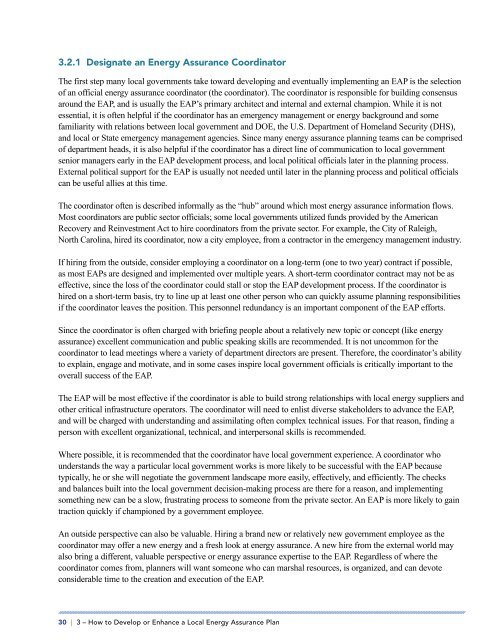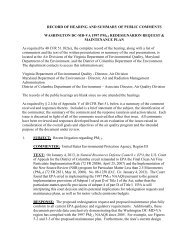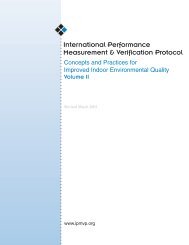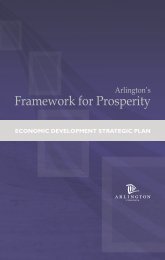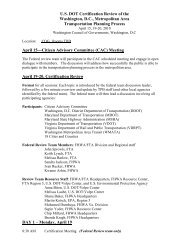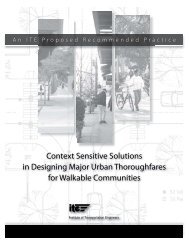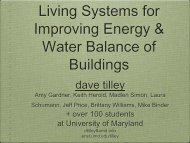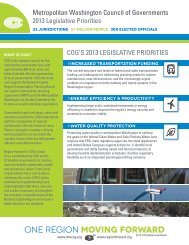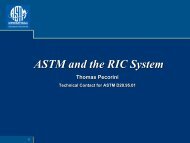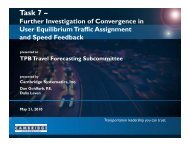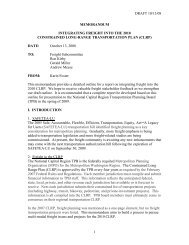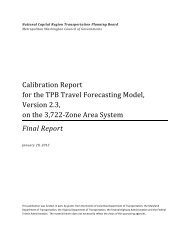PTI Local Government Energy Assurance Guidelines - Metropolitan ...
PTI Local Government Energy Assurance Guidelines - Metropolitan ...
PTI Local Government Energy Assurance Guidelines - Metropolitan ...
You also want an ePaper? Increase the reach of your titles
YUMPU automatically turns print PDFs into web optimized ePapers that Google loves.
3.2.1 Designate an <strong>Energy</strong> <strong>Assurance</strong> Coordinator<br />
The first step many local governments take toward developing and eventually implementing an EAP is the selection<br />
of an official energy assurance coordinator (the coordinator). The coordinator is responsible for building consensus<br />
around the EAP, and is usually the EAP’s primary architect and internal and external champion. While it is not<br />
essential, it is often helpful if the coordinator has an emergency management or energy background and some<br />
familiarity with relations between local government and DOE, the U.S. Department of Homeland Security (DHS),<br />
and local or State emergency management agencies. Since many energy assurance planning teams can be comprised<br />
of department heads, it is also helpful if the coordinator has a direct line of communication to local government<br />
senior managers early in the EAP development process, and local political officials later in the planning process.<br />
External political support for the EAP is usually not needed until later in the planning process and political officials<br />
can be useful allies at this time.<br />
The coordinator often is described informally as the “hub” around which most energy assurance information flows.<br />
Most coordinators are public sector officials; some local governments utilized funds provided by the American<br />
Recovery and Reinvestment Act to hire coordinators from the private sector. For example, the City of Raleigh,<br />
North Carolina, hired its coordinator, now a city employee, from a contractor in the emergency management industry.<br />
If hiring from the outside, consider employing a coordinator on a long-term (one to two year) contract if possible,<br />
as most EAPs are designed and implemented over multiple years. A short-term coordinator contract may not be as<br />
effective, since the loss of the coordinator could stall or stop the EAP development process. If the coordinator is<br />
hired on a short-term basis, try to line up at least one other person who can quickly assume planning responsibilities<br />
if the coordinator leaves the position. This personnel redundancy is an important component of the EAP efforts.<br />
Since the coordinator is often charged with briefing people about a relatively new topic or concept (like energy<br />
assurance) excellent communication and public speaking skills are recommended. It is not uncommon for the<br />
coordinator to lead meetings where a variety of department directors are present. Therefore, the coordinator’s ability<br />
to explain, engage and motivate, and in some cases inspire local government officials is critically important to the<br />
overall success of the EAP.<br />
The EAP will be most effective if the coordinator is able to build strong relationships with local energy suppliers and<br />
other critical infrastructure operators. The coordinator will need to enlist diverse stakeholders to advance the EAP,<br />
and will be charged with understanding and assimilating often complex technical issues. For that reason, finding a<br />
person with excellent organizational, technical, and interpersonal skills is recommended.<br />
Where possible, it is recommended that the coordinator have local government experience. A coordinator who<br />
understands the way a particular local government works is more likely to be successful with the EAP because<br />
typically, he or she will negotiate the government landscape more easily, effectively, and efficiently. The checks<br />
and balances built into the local government decision-making process are there for a reason, and implementing<br />
something new can be a slow, frustrating process to someone from the private sector. An EAP is more likely to gain<br />
traction quickly if championed by a government employee.<br />
An outside perspective can also be valuable. Hiring a brand new or relatively new government employee as the<br />
coordinator may offer a new energy and a fresh look at energy assurance. A new hire from the external world may<br />
also bring a different, valuable perspective or energy assurance expertise to the EAP. Regardless of where the<br />
coordinator comes from, planners will want someone who can marshal resources, is organized, and can devote<br />
considerable time to the creation and execution of the EAP.<br />
30 | 3 – How to Develop or Enhance a <strong>Local</strong> <strong>Energy</strong> <strong>Assurance</strong> Plan


